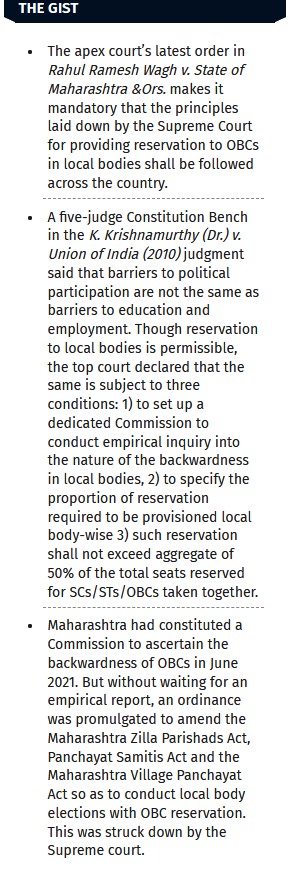Indian Polity
OBC Reservation in Local Body Polls
- 22 Jan 2022
- 6 min read
For Prelims: OBC Reservation, Urban Local Bodies.
For Mains: Significance of OBC Reservation in Local Body Elections.
Why in News
Recently, the Supreme Court (SC) while hearing a plea by the Maharashtra government decided to recall its December 2021 order, which stayed 27% reservation for Other Backward Classes (OBCs) in local body elections.
- The Supreme Court has entrusted the Backward Classes Commission with the responsibility of giving political reservation to OBCs in the upcoming local body elections in Maharashtra.
- Maharashtra is not the only state where OBC reservation in local bodies was stayed. In December 2021, the top court passed a similar order for the Madhya Pradesh government, directing the OBC seats to be notified as general category for failing to comply with the three-test criteria (as stated in the 2010 judgement).
- Likewise, the Madhya Pradesh government has filed a similar application, claiming to have 51% OBC population in the state.
Key Points
- Background:

- In March 2021, the SC asked the state government to comply with triple conditions — setting up a dedicated commission for collecting empirical data on the OBC population, specifying the proportion of reservation and ensuring that the cumulative share of reserved seats don’t breach 50% of total seats.
- Following the SC order, the government appointed the dedicated commission for empirical data of OBCs and also promulgated an ordinance to give up to 27% reservation to the OBCs in local bodies without exceeding the 50% ceiling limit of the reservation.
- However, the apex court stayed it in December 2021, saying it cannot be implemented without the empirical data, and asked the State Election Commission (SEC) to convert the OBC seats into the general category and hold the elections.
- Plea:
- The Maharashtra government claimed that the top court’s December order would result in two adverse effects.
- The persons belonging to OBC are deprived of an opportunity to be elected to the elected positions through democratic process and fulfill the aspirations of not only the residents of the OBC community but everyone else, which helps in the development of leadership quality in such communities.
- Such inadequate representation or non-representation of OBCs is strictly contrary to the object, intent and purpose of the Constitutional scheme.
- The state also claimed that it had already complied with two of the three-fold test guidelines by appointing a commission and gathering data.
- The reservation in various districts of Maharashtra is based on the proportion of population of OBCs in the respective districts and is not a blanket reservation of 27% in all the districts in the entire state of Maharashtra.
- As an intermediate measure to justify the 27% OBC quota in local bodies, the state referred to a sample survey which said that the distribution of OBCs in the sample size was found to be 48.6%.
- SC’s Direction:
- The Supreme Court directed the Maharashtra government to submit data on OBCs to the MSCBC (Maharashtra State Commission for Backward Classes) to examine its correctness and make recommendations on their representation in elections for the local bodies.
- Implications:
- The SC’s order has increased the chances of restoring the OBC quota in the upcoming local bodies polls.
- The government data includes the various surveys of the state’s rural development department and urban development department carried out in the local bodies for poverty alleviation, health and education sectors.
- The government is likely to refer to the data of the previous backward classes commission and the census 2011 data as well.
- The government should ensure proper coordination with the MSCBC and the State Election Commission (SEC) and should work together to restore the OBC quota in the local bodies.
The 2010 Judgement
- The five-judge Constitution Bench decision in K. Krishnamurthy (Dr.) v. Union of India (2010) wherein the Supreme Court had interpreted Article 243D(6) and Article 243T(6), which permit reservation by enactment of law for backward classes in panchayat and municipal bodies respectively, to hold that barriers to political participation are not the same as that of the barriers that limit access to education and employment.
- However, for creating a level playing field, reservation may be desirable as mandated by the aforementioned Articles which provide a separate constitutional basis for reservation, as distinct from what are conceived under Article 15 (4) and Article 16 (4) which form the basis for reservation in education and employment.
- Though reservation to local bodies is permissible, the top court declared that the same is subject to empirical finding of backwardness in relation to local bodies as fulfilled through the three tests.






